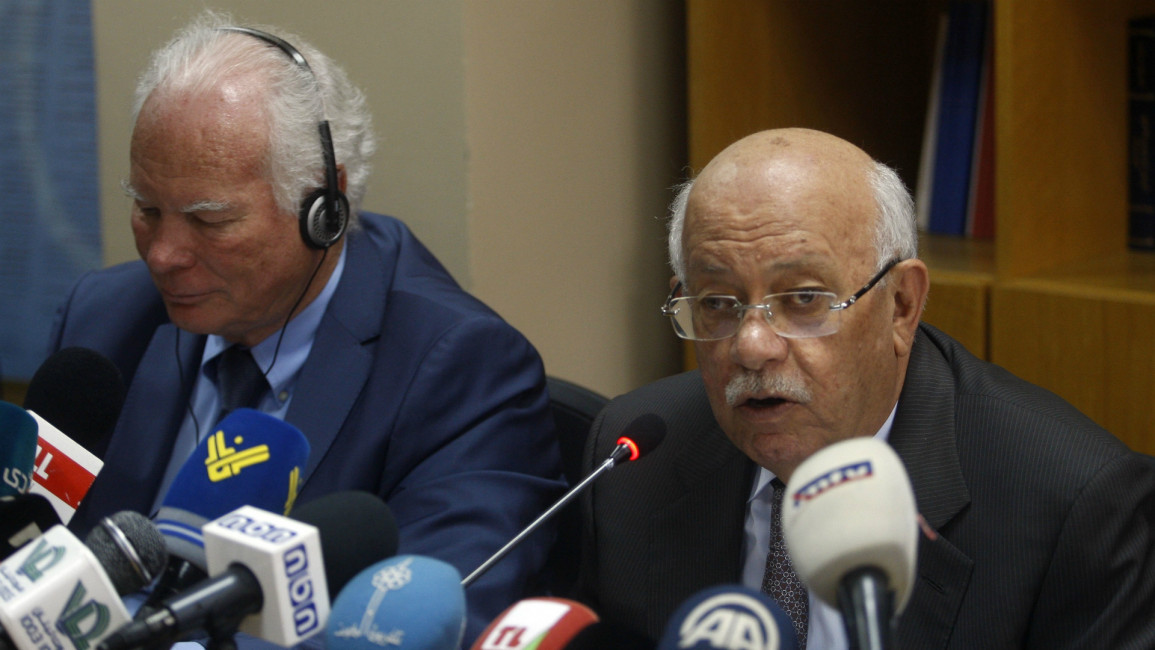Lebanese minister ready to facilitate return of Syrian refugees
Lebanese minister ready to facilitate return of Syrian refugees
Lebanese minister of social affairs said he's ready to coordinate with Syrian regime to facilitate the return of Syrian refugees after Lebanese FM said more are being registered with UNHCR.
3 min read
Lebanese Social Affairs Minister Rashid Derbas (R) [Anadolu]
Lebanese Minister of Social Affairs Rashid Derbas told reporters on Tuesday that Lebanon is ready to coordinate with the Syrian regime to facilitate the return of Syrian refugees in Lebanon to their country.
This came after Lebanese Foreign Minister Gebran Bassil said increasing number of refugees are being registered with the United Nations High Commissioner for Refugees (UNHCR).
Lebanon is not party to the 1951 Refugee Convention, which defines who is a refugee, their rights, and the legal obligations of states. However, Lebanon has allowed more than 1.3 million Syrian refugees into the tiny country, which has a population of around 4 million people.
According to the UNHCR, Lebanon has received the highest number of Syrian refugees in the world and has given them access to most basic services through public institutions.
However, the country does not have the capacity to respond to and withstand the Syria crisis.
The Lebanese government had established an inter-ministerial crisis cell to deal with the refugee crisis. Derbas and Bassil are members of this cell, but they are often at loggerheads over the way the crisis should be handled.
"The [Lebanese] government is ready to facilitate the return of Syrians [to their country] or their travel to other countries," Derbas said.
"We are ready to cooperate with the Syrian government if they had any plan to receive a number of the refugees," he added.
Many Syrians oppose the regime in Syria and refuse to register with their embassy in Lebanon, perhaps out of fear.
Political, economic, demographic, and security considerations have also meant thousands of Syrian new-borns in Lebanon do not possess official birth certificates.
Bassil had on Monday warned again of what he called a "prelude to imposing the settlement of Syrian refugees in Lebanon through the registration of Syrian births with the UNHCR."
Bassil told reporters that the "UNHCR, through registering Syrian births in their records instead of having them registered at the Syrian embassy and the Lebanese Ministry of Interior, would be acting contrary to international law and the decisions made by the Lebanese government."
As a response to Bassil, Derbas told reporters that no Syrians have been registered as refugees with the UNHCR since 5 January 2015.
However, he added that "the exceptional humanitarian criteria agreed upon by the crisis cell, which includes Bassil, allow the registration of minors who come to Lebanon to join their parents," and asked, "Do we allow minors to join their families and prevent new-borns from doing so?"
This came after Lebanese Foreign Minister Gebran Bassil said increasing number of refugees are being registered with the United Nations High Commissioner for Refugees (UNHCR).
Lebanon is not party to the 1951 Refugee Convention, which defines who is a refugee, their rights, and the legal obligations of states. However, Lebanon has allowed more than 1.3 million Syrian refugees into the tiny country, which has a population of around 4 million people.
According to the UNHCR, Lebanon has received the highest number of Syrian refugees in the world and has given them access to most basic services through public institutions.
However, the country does not have the capacity to respond to and withstand the Syria crisis.
The Lebanese government had established an inter-ministerial crisis cell to deal with the refugee crisis. Derbas and Bassil are members of this cell, but they are often at loggerheads over the way the crisis should be handled.
| The government is ready to facilitate the return of Syrians [to their country] or their travel to other countries. Lebanese Minister of Social Affairs Rashid Derbas |
"The [Lebanese] government is ready to facilitate the return of Syrians [to their country] or their travel to other countries," Derbas said.
"We are ready to cooperate with the Syrian government if they had any plan to receive a number of the refugees," he added.
Many Syrians oppose the regime in Syria and refuse to register with their embassy in Lebanon, perhaps out of fear.
Political, economic, demographic, and security considerations have also meant thousands of Syrian new-borns in Lebanon do not possess official birth certificates.
Bassil had on Monday warned again of what he called a "prelude to imposing the settlement of Syrian refugees in Lebanon through the registration of Syrian births with the UNHCR."
Bassil told reporters that the "UNHCR, through registering Syrian births in their records instead of having them registered at the Syrian embassy and the Lebanese Ministry of Interior, would be acting contrary to international law and the decisions made by the Lebanese government."
As a response to Bassil, Derbas told reporters that no Syrians have been registered as refugees with the UNHCR since 5 January 2015.
However, he added that "the exceptional humanitarian criteria agreed upon by the crisis cell, which includes Bassil, allow the registration of minors who come to Lebanon to join their parents," and asked, "Do we allow minors to join their families and prevent new-borns from doing so?"


![President Pezeshkian has denounced Israel's attacks on Lebanon [Getty]](/sites/default/files/styles/image_684x385/public/2173482924.jpeg?h=a5f2f23a&itok=q3evVtko)



 Follow the Middle East's top stories in English at The New Arab on Google News
Follow the Middle East's top stories in English at The New Arab on Google News


